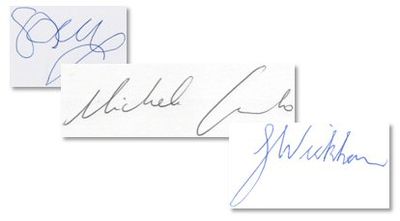ICFHR 2012 Signature Verification Competition (4NSigComp2012)
Datasets -> Datasets List -> Current Page
|
Contents
Contact Author
Dr. phil. nat. Marcus Liwicki DFKI - German Research Center for Artificial Intelligence Trippstadter Str. 122 D-67663 Kaiserslautern, Germany E-mail: liwicki@dfki.uni-kl.de Phone +49 (0) 631 20575 1200 Fax +49 (0) 631 20575 1020
Current Version
1.0
Keywords
Forensic signature analysis, offline handwriting, signature, verification
Description
The data contain only offline signature samples. The signatures were collected under supervision of Bryan Found and Doug Rogers in the years 2001, 2002, 2004, 2005 and 2006, respectively. The images were scanned at 600dpi/300dpi resolution and cropped at the Netherlands Forensic Institute for the purpose of this competition.
Technical Details
The training set comprised training and test set of the 4NSigComp2010, i.e., a previous competition of this series. In all it has data from two specimen writers/authors, A and B, respectively. There are 9 reference signatures from writer A and 200 questioned signatures. From these 200 questioned signatures, 76 are genuine, 104 simulated/forged, and 20 disguised signatures. There are 25 reference signatures from writer B and 100 questioned signatures. From these 100 questioned signatures, 3 are genuine, 90 simulated/forged, and 07 disguised signatures.
For further details about the training set, please see the 4NSigComp2010 competition pages here.
For the test set signature samples were provided by the Forensic Expertise Profiling Laboratory (FEPL) of La Trobe University. It contained signature samples from three specimen writers/authors, ’A1’, ’A2’, and ’A3’ respectively. The questioned samples were a mixture of genuine signatures, disguised signatures and skilled forgeries as given in tables 1 and 2. All signatures were written using the same make of ball-point pen and the same make of paper. The questioned samples were numbered randomly, scanned and inkjet or laser printed into a booklet.
Data Acquisition Details
Training Set
The training set used for this competition comprises the training and test set of the 4NSigComp2010, available for download here.
Test Set
Collection of genuine signatures
For specimen author 'A1', 3 normal signatures per day (written with a ball point pen) over a fifteen day period, 6 disguised signatures per day (written with a ball point pen) over a fifteen day period, and 6 normal signatures per day (written with a pencil) over a three day period were collected. From normal signatures pool the genuine and reference signatures for specimen author 'A1' were drawn. For specimen author 'A2' and 'A3', the normal and disguised signatures were written over a 10 and 15 days period respectively. From normal signatures pool the genuine and reference signatures were drawn for these specimen authors.
Collection of forged/simulated signatures
For forging the signatures of specimen author 'A1', two 'forgers' were selected from the academic staff at La Trobe University. Each of the forgers was provided with 6 normal samples of the questioned signature written by 'A1'. Forgers were instructed that they could use any or all of the supplied specimen signatures as models for their forgeries. Forgers were also instructed that their forgeries must be unassisted (not tracings). Each forger was asked to complete the following task each day over a 10 day period.
- 25 practice signatures (ball point pen)
- 5 forgeries (ball point pen)
- 5 forgeries (pencil)
The forgeries, other than the practice attempts, were used as a pool from which the questioned forged signatures were selected. For forging the signatures of specimen author 'A2', 31 adult 'forgers' were used. These individuals were volunteers drawn from a single private company. Each of the forgers was provided with 3 original normal samples of the signature written by the specimen writer. These forgers were instructed similar to the forgers of 'A1', mentioned above. For forging the signatures of 'A3', 6 adult 'forgers' were used. These individuals were volunteers. Each of the forgers was provided with 3 original normal samples of the signature written by the specimen writer. These forgers were also instructed as above.
Folder Structure and File Naming
The folder structure of the training set is tha same as for the 4nSigComp2010 competition, and is given here.
The signatures of the test set are arranged according to the following folder structure:
- Questioned: Contains all the questioned signatures of the three specimen authors/writer
- A1: Questioned signatures of Author ‘A1’
- A2: Questioned signatures of Author ‘A2’
- A3: Questioned signatures of Author ‘A3’
- Ref: Contains all the reference signatures from the three specimen authors/writer
- A1: Reference signatures of Author ‘A1’
- A2: Reference signatures of Author ‘A2’
- A3: Reference signatures of Author ‘A3’
- Correct Answer Key (MS Excel sheet)
References
- Marcus Liwicki, Muhammad Imran Malik , Linda Alewijnse, Elisa van den Heuvel, Bryan Found,. "ICFHR2012 Competition on Automatic Forensic Signature Verification (4NsigComp 2012) ", Proc. 13th Int. Conference on Frontiers in Handwriting Recognition, 2012.
Disclaimer
The data of the 4NsigComp2012 may only be used for research purpose. Users are not allowed to add images of the signatures into their publications. Furthermore, any scientific work using these signatures should refer to the abovementioned Reference 1.
Submitted Files
Version 1.0
Files
Note: the password for opening the zip files is "I hereby accept the 4NsigComp2012 disclaimer." (without the double quotes).
- The training set for this competition comprises the training and test sets of 4NSigComp2010, available for download here
- Test set (245 MB)
This page is editable only by TC11 Officers .
